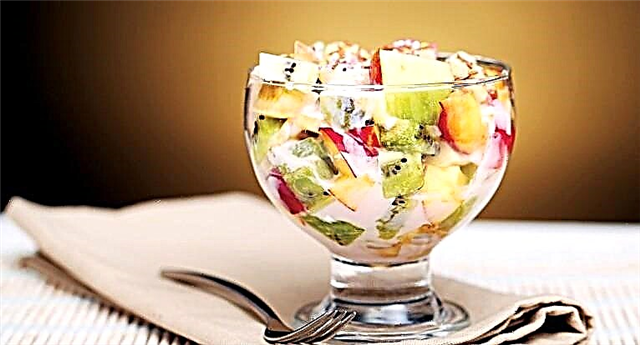Often talked about the benefits of cheese for the healthy development of the child. As with all complementary foods, it must be administered with care. When does it become possible to give cheese to babies, in what quantities, what varieties and how often?

Child with cheese
Useful properties of cheese
Cheese is a product made from goat, cow, and sheep milk. In addition to its excellent taste, it has properties useful for children, with it you can prepare many new dishes for the baby, which will help to diversify its diet.
Composition and nutritional value
- The product is rich in calcium, which is necessary for strengthening bones;
- Contains a lot of high quality protein, as well as vitamins A and D to aid growth. Other vitamins - B12, E, nicotinic acid;
- The high calorie content of cheese, even in small quantities, provides the body with energy;
- The product is good for teeth, prevents tooth decay;
- The presence of fatty acids improves skin condition;
- The minerals that the product contains (potassium, sodium, iron, sulfur, zinc, phosphorus, magnesium, etc.) are necessary for the proper functioning of various organs.
Choosing the right cheese
There are many types of different cheeses on sale. However, not all of them are suitable for children.
Important! Parents should be very careful when choosing dairy products for their children. Cheese made from unpasteurized milk carries the risk of contamination with Listeria, a harmful bacteria.
Although cheese is a complete and healthy food, avoid foods high in salt and saturated fat.
Varieties of cheeses
Each species has its own advantages, tastes and textures. For baby food, it is not the taste of the product that is more important, but its ability not to harm the health of the baby.
Soft young varieties that not all adults love, but they are great for children:
- Mascarpone;
- Ricotta.

Ricotta variety
Cottage cheese can be attributed to soft young cheeses. Hard and semi-hard cheeses can be eaten by babies, provided that they do not contain a lot of fat (up to 30% permissible). These are varieties such as:
- Mozzarella;
- Cheddar (dietary option, fat content - 33%);
- Altermani.
Edam, Gouda, Rokiskis, Svalya - products where the mass fraction of fat is too high for babies (up to 50%). A one-year-old baby is not yet ready to use these varieties, if he is already 2 years old, this is the age when they can be given to a child.
Important! It is recommended to pay attention to the labels, as many cheeses intended for children, especially in single packs, are high in fat.
Varieties that should not be given to infants:
- Blue cheeses are not recommended at an early age, as they contain mold and fungi (Roquefort, Dor Blue, Gorgonzola, etc.);

Blue cheese
- With white mold (Brie, Camembert) they are characterized by high fat content;
- Smoked varieties;
- Products containing various spices, spicy or aromatic;
- Cooked using brine (feta, suluguni, adyghe, feta cheese) absorb too much salt during the production process;
- Processed cheese is not exactly cheese. Although it may taste and look similar, this product is usually loaded with chemicals. It is made on the basis of real cheese, but with flavor enhancers and preservatives that extend the shelf life. Therefore, the product is not suitable for baby food;
- It is also not recommended to feed children with palm oil-based cheese products and glazed curds. They contain ingredients that are unacceptable for a baby's nutrition.
Hard varieties with a long ripening period (Parmesan, Dzhugas) have a fat content of about 30%, but they crumble strongly. A toddler may accidentally choke on a large piece. Therefore, they are grated and used to prepare children's meals.

Parmesan variety
Important! When choosing cheese for a child, you need to read what ingredients the product contains and its expiration date.
Age of introduction of cheese into complementary foods
Most babies can be given cheese as soon as they start chewing on a variety of foods, around the age of 6 to 9 months. However, experts disagree on the age at which a child should be given cheese. Some say the age is 8 months, others advise waiting up to 1 year.
This divergence of opinion stems from the fact that cheese is a dairy product and that infants may have stomach upset from consuming milk proteins. It is known that when cheese ripens, milk proteins and lactose break down, turning into simpler compounds, therefore fears are exaggerated. However, some children are allergic to dairy products. These babies should only be fed cheese if permitted by their pediatrician.
Dr. Komarovsky has his own opinion when a child under one year old can be given cheese. He advises to start introducing the baby to this product with cottage cheese, at about 8 months, a little later, you can give soft types of cheese.
In what forms to give cheese
When a mom decides to add cheese to her baby, there are several good ways to serve it:
- Melting cheese on a small piece of biscuit or bread and serving as a snack;
- Cut it into small pieces, no larger than a baby's marigold;
- Mix the cheese slices with the cooked vegetables.
Important! You should start with cheeses that have a mild flavor. Foods with a strong taste and smell can immediately reject your baby.
Complementary feeding rates
Many pediatricians recommend giving dairy products starting with natural yogurt. The concentration of milk protein in it is not so high. You need to start with a couple of spoons and gradually increase the amount. If the baby's body safely tolerates this product, then you can slowly give cottage cheese and cheese.
How often to give
The product does not need to be added to the daily diet of children under one year old. It will be enough to feed them to the baby every 2-3 days.
Quantitative norms
How much cheese can you give a child depending on age:
- The first portion of the product for a baby who is not yet a year old should not exceed 5 grams per day;
- After a year and a half, the daily amount of the product is brought to 15 grams, two-year-old children can already consume 20 grams per day.
What to combine with
Fresh fruits and boiled vegetables (carrots, pumpkin) can be great cheese companions. Combination with meat products or butter, fish will be difficult for the baby's digestive system due to the saturation of these products with fats and proteins. Older children can be given cheese soups, pasta or omelet with cheese, cottage cheese pancakes.

Cottage cheese pancakes
Possible problems
Although cheese is not an allergenic food, it can provoke a negative reaction in a child because it contains milk proteins. It should be given especially carefully if the baby has already had a food allergy.
Important! No need to worry if your baby is lactose intolerant. Its cheeses contain an insignificant amount.
Signs of allergies
Food allergy symptoms:
- swelling of the face, including the tongue and lips;
- skin rashes;
- nausea and vomiting;
- diarrhea;
- abdominal cramps;
- shortness of breath or wheezing.
If these symptoms appear, you should immediately call a doctor. Cheese not only tastes great, it is nutritious and contains healthy proteins, vitamins and trace elements. The product will serve as an excellent addition to the baby's menu, subject to the rules of complementary feeding.



